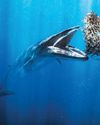
? What would happen if the Sun stopped producing light?
Anna-Elizabeth
It takes light from the Sun around eight minutes to travel across space to Earth. This means if the Sun suddenly stopped shining, there would be eight minutes before the planet was plunged into darkness. Most energy sources would still work and the electricity would stay on, so the darkness wouldn’t be total.
Sunlight fuels photosynthesis (how plants produce food), so plants would all die. Then, plant-eating animals would die off, reducing the food supply for meat-eating animals. Humans have lots of provisions stored up, but we too would soon face widespread shortages. Within a week, temperatures would drop to -17ºC, and down to -73ºC within a year. This would cause the ocean surface to freeze over. Water deeper down would stay liquid, meaning life around hydrothermal vents (fuelled by heat from inside the planet, rather than the Sun) would still survive.
? Is it possible to teleport?
Gabriel
Bu hikaye The Week Junior Science+Nature UK dergisinin Issue 78 sayısından alınmıştır.
Start your 7-day Magzter GOLD free trial to access thousands of curated premium stories, and 9,000+ magazines and newspapers.
Already a subscriber ? Giriş Yap
Bu hikaye The Week Junior Science+Nature UK dergisinin Issue 78 sayısından alınmıştır.
Start your 7-day Magzter GOLD free trial to access thousands of curated premium stories, and 9,000+ magazines and newspapers.
Already a subscriber? Giriş Yap

Camera Obscura
Imagine stepping inside a dark room, where the only source of light comes through one small hole in the wall.

MANCHESTER SCIENCE FESTIVAL
From 18-27 October, shoppers at the Arndale shopping centre in Manchester, England, will face a giant spider.

Should musicians stop touring?
Multiple concerts travelling around the world have a big impact on the environment.

Are ghosts real?
Plenty of people believe in ghosts, but it's hard to find proof.

SMASH STEREOTYPES
In an extract from his prize-winning book, scientist and writer Adam Rutherford shows you how to use the power of science to fight racism. This chapter, titled Myth-Busting, is all about sport.

Animal awareness
What would it feel like to be another animal?

Hamza Yassin
Go behind the camera with a wildlife filmmaker.

WILDLIFE WATCH
Ben Hoare goes on a safari from his sofa to discover how nature documentaries are made.

Big bum breakthrough
A team of researchers who found out that mammals can breathe through their bottoms have won a prize at the lg Nobel awards.

A jaw-dropping undersea snap
A photograph of a Bryde's whale feeding on a heart-shaped \"bait ball\" of sardines has won the Ocean Photographer of the Year contest.